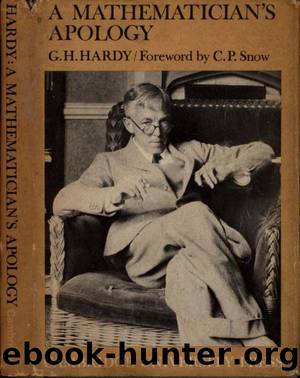A Mathematicians Apology by G.H. Hardy

Author:G.H. Hardy
Language: eng
Format: epub
Tags: Mathematics; Biography; Analysis; Ramanujan
Newton, Einstein have in their times changed its whole direction.
The seriousness of a theorem, of course, does not lie in its consequences, which are merely the evidence for its seriousness. Shakespeare had an enormous influence on the development of the English language, Otway next to none, but that is not why Shakespeare was the better poet. He was the better poet because he wrote much better poetry. The inferiority of the chess problem, like that of Otway's poetry, lies not in its consequences but in its content.
There is one more point which I shall dismiss very shortly, not because it is uninteresting but because it is difficult, and because I have no qualifications for any serious discussion in aesthetics. The beauty of a mathematical theorem depends a great deal on its seriousness, as even in poetry the beauty of a line may depend to some extent on the significance of the ideas which it contains. I quoted two lines of Shakespeare as an example of the sheer beauty of a verbal pattern; but
After life's fitful fever he sleeps well
90
seems still more beautiful. The pattern is just as fine, and in this case the ideas have significance and the thesis is sound, so that our emotions are stirred much more deeply. The ideas do matter to the pattern, even in poetry, and much more, naturally, in mathematics; but I must not try to argue the question seriously.
12
It will be clear by now that, if we are to have any chance of making progress, I must produce examples of 'real' mathematical theorems, theorems which every mathematician will admit to be first-rate. And here I am very heavily handicapped by the restrictions under which I am writing. On the one hand my examples must be very simple, and intelligible to a reader who has no specialized mathematical knowledge; no elaborate preliminary explanations must be needed; and a reader must be able to follow the proofs as well as the enunciations. These conditions exclude, for instance, many of the most beautiful theorems of the theory of numbers, such as Fermat's' two
square' theorem or the law of quadratic reciprocity. And on the other hand my examples should be drawn from 'pukka' mathematics, the mathematics of the working professional mathematician; and this condition excludes a good deal which it would be comparatively easy to make intelligible but which trespasses on logic and mathematical philosophy.
I can hardly do better than go back to the Greeks. I will state and prove two of the famous theorems of Greek mathematics. They are' simple' theorems, simple both in idea and in execution, but there is no doubt at all about their being theorems of the highest class. Each is as fresh and significant as when it was discoveredâtwo thousand years have not written a wrinkle on either of them. Finally, both the statements and the proofs can be mastered in an hour by any intelligent reader, however slender his mathematical equipment.
i. The first is Euclid's* proof of the existence of an infinity of prime numbers.
Download
This site does not store any files on its server. We only index and link to content provided by other sites. Please contact the content providers to delete copyright contents if any and email us, we'll remove relevant links or contents immediately.
Modelling of Convective Heat and Mass Transfer in Rotating Flows by Igor V. Shevchuk(6440)
Weapons of Math Destruction by Cathy O'Neil(6280)
Factfulness: Ten Reasons We're Wrong About the World – and Why Things Are Better Than You Think by Hans Rosling(4742)
A Mind For Numbers: How to Excel at Math and Science (Even If You Flunked Algebra) by Barbara Oakley(3307)
Descartes' Error by Antonio Damasio(3279)
Factfulness_Ten Reasons We're Wrong About the World_and Why Things Are Better Than You Think by Hans Rosling(3237)
TCP IP by Todd Lammle(3185)
Fooled by Randomness: The Hidden Role of Chance in Life and in the Markets by Nassim Nicholas Taleb(3124)
The Tyranny of Metrics by Jerry Z. Muller(3073)
Applied Predictive Modeling by Max Kuhn & Kjell Johnson(3071)
The Book of Numbers by Peter Bentley(2968)
The Great Unknown by Marcus du Sautoy(2695)
Once Upon an Algorithm by Martin Erwig(2649)
Easy Algebra Step-by-Step by Sandra Luna McCune(2635)
Lady Luck by Kristen Ashley(2582)
Police Exams Prep 2018-2019 by Kaplan Test Prep(2549)
Practical Guide To Principal Component Methods in R (Multivariate Analysis Book 2) by Alboukadel Kassambara(2544)
All Things Reconsidered by Bill Thompson III(2393)
Linear Time-Invariant Systems, Behaviors and Modules by Ulrich Oberst & Martin Scheicher & Ingrid Scheicher(2371)
